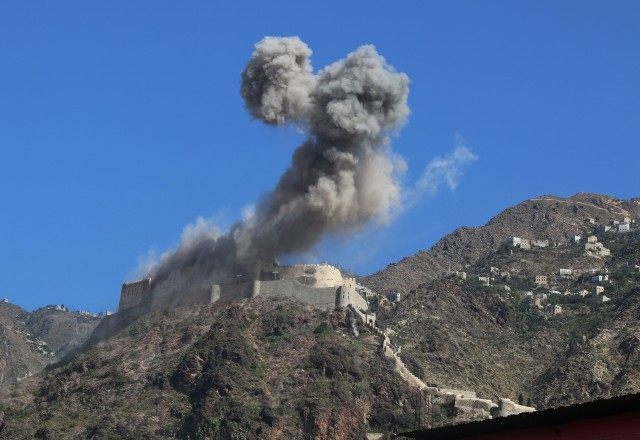The number of U.S. military airstrikes against al-Qaeda in Yemen so far this month have surpassed those that occurred during any year under former President Barack Obama’s presidency.
In just the first days of March, the U.S. military under President Donald Trump’s watch struck 40 targets in Yemen linked to al-Qaeda in the Arabian Peninsula (AQAP), reports Foreign Policy (FP), adding:
The weeklong blitz in Yemen eclipsed the annual bombing total for any year during Obama’s presidency. Under the previous administration, approval for strikes came only after slow-moving policy discussions, with senior officials required to sign off on any action. The Trump administration has proven much quicker at green-lighting attacks.
As of March 3, American forces had already “carried out more than 30 strikes” against AQAP in Yemen for this month alone, according to the U.S. Department of Defense (DOD).
According to the Bureau of Investigative Journalism, total U.S. drone and airstrikes in Yemen reached 38 in all of 2016.
FP reports:
Throughout 2016, the Pentagon continually briefed the White House on ways to get more aggressive with al Qaeda in the Arabian Peninsula, or AQAP, as they watched the group gain strength in their Yemeni strongholds. Those strikes didn’t happen, “but just because the clock ran out,” the [anonymous former defense] official said.
Foreign Policy’s comparison between Trump’s aggressive approach to combating AQAP and the more cautious modus operandi employed by his predecessor come less than a week after experts warned lawmakers that the al-Qaeda wing is building an Islamic state in Yemen.
Foreign Policy points out:
President Donald Trump’s readiness to order military action stands in contrast to the previous administration. When Obama’s national security advisor Susan Rice ran the policymaking process, “stuff moved like molasses through the National Security Council,” much to the frustration of military planners at U.S. Central Command, a former senior defense official, who spoke on condition of anonymity, told Foreign Policy. The interagency discussions allowed plans to languish for weeks while debates swirled over when and how to act.
Last month, the International Crisis Group (ICG) reported that AQAP, considered by the U.S. military to be determined to attack America and other Western nations, “is stronger than it has ever been.”
The ICG assessment echoed an April 2016 investigation by Reuters that determined AQAP had “become stronger than at any time since it first emerged almost 20 years ago.”
FP notes, “The apparent urgency of the latest round of strikes underscores how concerned senior military and intelligence officers are about the threat of AQAP carrying out attacks in the West.”
Pentagon spokesman Capt. Jeff Davis recently noted that AQAP “has more American blood on its hands” than the Islamic State (ISIS/ISIL).
AQAP, considered the most dangerous branch of al-Qaeda, has exploited the deteriorating security and humanitarian situation in Yemen, seizing territory and recruiting fighters.
Since March 2015, a Saudi-led Sunni coalition has been primarily combating the Iran-allied Shiite Houthis and their allies, forces loyal to former Yemeni President Ali Abdullah Saleh.
For the most part, the Saudi-led coalition, which has received U.S. assistance, has ignored the Sunni AQAP terrorist group.
Al-Qaeda has capitalized on the Saudi-led coalition’s single-minded focus to defeat Shiite Houthis.
Thomas Joscelyn, an expert at the Foundation for the Defense of Democracies (FDD) think tank, recently told lawmakers that “some of AQAP’s leaders are also partnered with Saudi Arabia, the United Arab Emirates, and [President Abdrabbuh Mansur] Hadi’s government in the war against the Houthis.”
“U.S. forces will continue to target [AQAP] militants and facilities in order to disrupt the terrorist organization’s plots and ultimately to protect American lives,” Capt. Davis said in early March.
“They’ve taken advantage of ungoverned spaces in Yemen to plot, direct and inspire terrorist attacks against the United States,” he added. “We’ll continue to work with the government of Yemen and our partners on the ground to defeat [the organization] and deny it the ability to operate.”

COMMENTS
Please let us know if you're having issues with commenting.